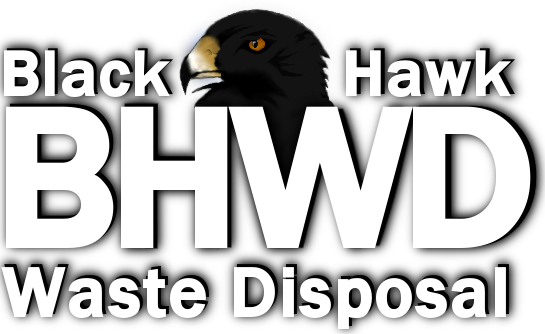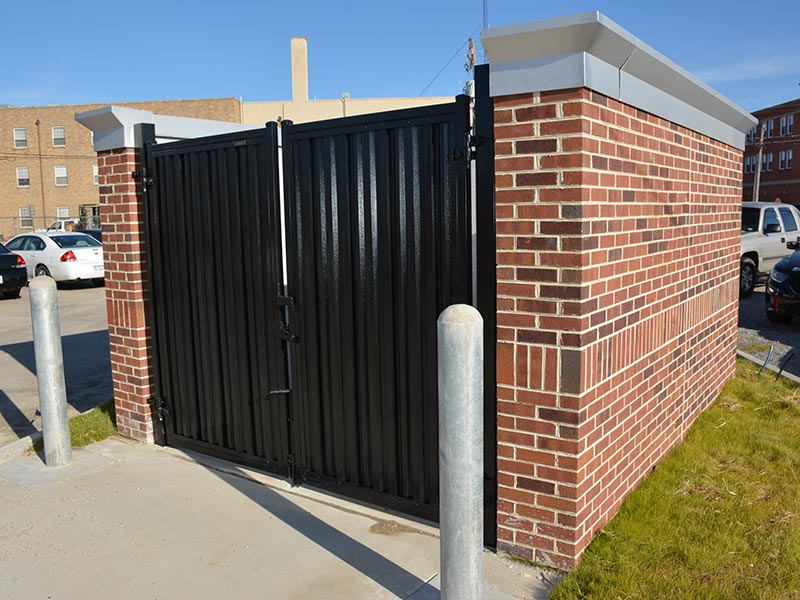Commercial Services are designed for Small and Medium sized businesses that need regular refuse collection. Larger commercial businesses, and industrial buildings may need a larger disposal solution, such as a trash or recycling compactor. Information for compactors can be found here.
We provide service Monday through Saturday with flexible schedules including Daily, Weekly, Bi-Weekly, Monthly for both trash and recycling.
Commercial Service is recommended for
- Small Businesses
- Medium Businesses
- Home Shops
- Strip Malls
- Apartment Complexes
- Offices
- Hotels
- Schools
- Gas Stations
- Farms
- Auto Shops
- and more
Not sure which service is right for you? We can help!
Commercial Container Information
Health, Safety, and Upkeep
We recommend the following things to prevent health and safety issues and for general upkeep.
- Choose the dumpster for your needs. If you frequently have extra refuse above the normal capacity of your dumpster, it may be time to upgrade size or frequency. A dumpster that is overflowing with refuse, preventing your lid from closing, or causing refuse to fall on the ground, will encourage illegal dumping, rodents, insects, code enforcement visits, and health inspections.
- Keep your dumpster on solid surfaces when possible. This prevents weeds from growing under and around the container, and helps to discourage rodents or other small creatures from living inside or under your dumpster.
- Avoid throwing liquid waste into your dumpster. Our dumpsters are not meant for liquids and will leak any liquid thrown away. The landfill prohibits liquids from being disposed of.
- Restaurants, Auto Shops, and other places of business with liquids to dispose of should contact the proper companies for their liquid. You can search for proper disposal locations for hazardous refuse at Earth911.com.
A list of unaccepted items can be found here.
Available Sizes
Our commercial dumpsters come in various sizes.
1 1/2yd, 2yd, 3yd, 4yd, 6yd, and 8yds are available in both Front and Rear load styles.
 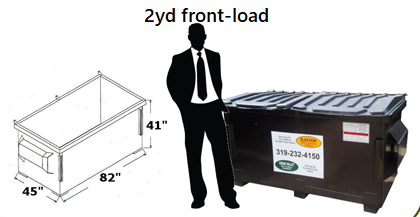 | 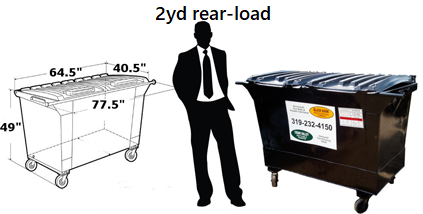  |
 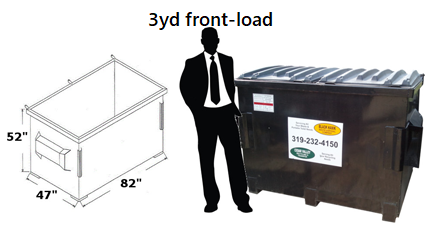 | 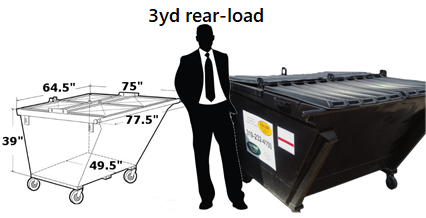  |
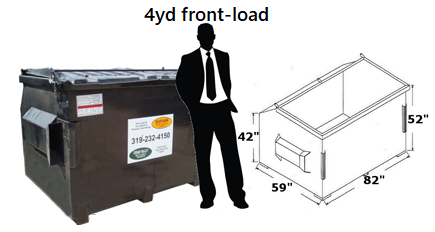  | 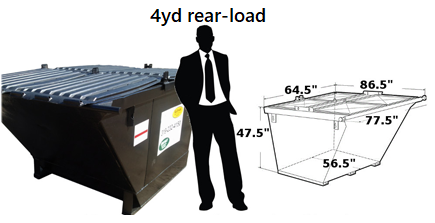  |
 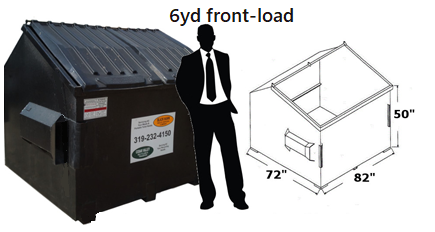 | 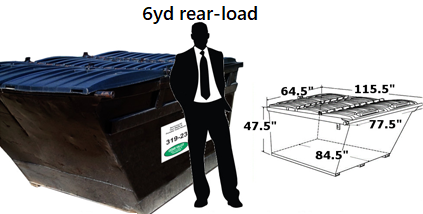  |
 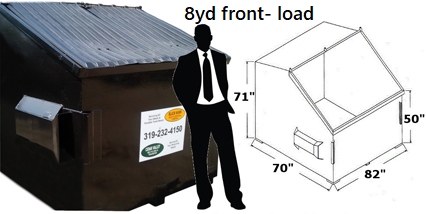 | 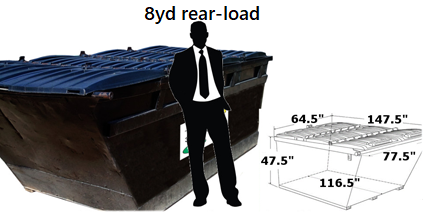  |
Most commercial dumpsters will have 2-4 plastic lids and be made of metal. Alterations can be made depending on the need of a business, such as metal lids, doors on the sides, wheels, skids, chains, and bar-locks.
Differences between Front and Rear Load
These containers are called front load and rear load because the way they are emptied.
Description of Front Load containers
- Front Load dumpsters are taller than rear load
- Each Front Load has metal pockets on each side of the container
- 2yd, 3yd, & 4yd Front Load dumpsters have flat tops
- Typically 6yd & 8yd Front Load dumpsters have slanted tops. Alternate styles are available
- Front Load dumpsters get taller with each additional cubic yardage
Description of Rear Load containers
- The dumpsters are always the same height, and increase in length with each additional cubic yardage
- Each Rear Load has a bar sticking out from each side
- Rear Load dumpsters all have flat tops
Collection Process
Emptying a front load is very simple and takes under 5 minutes.
The truck drives forward to the container then hydraulic cylinders extend “arms” that fit into side pockets on the container. The container is lifted overhead and dumped directly into the truck. The material inside is compacted toward the back of the truck. The container is set back on the ground in the same spot it was picked up from. The truck then backs away from the container and is done with that stop.
Emptying a rear load is a bit lengthier and takes between 5 minutes to 25 minutes depending on the volume and contents of the container.
The truck backs up to the container and fits the metal bar into a specially designed mechanism that locks the container in place. The entire container is tipped forward, bringing the container up into the air. The contents spill forward into the back of the truck.
If the container is very full or has a large volume capacity, it may take 2-4 tips before it is completely empty.
Illegal Dumping Prevention
One of the most common challenges with commercial dumpsters is illegal dumping. These methods will help prevent illegal dumping and what method is right for you will vary by how often you experience illegal dumping.
- If possible, keep your dumpster out of sight from the road.
- Install a camera and security light.
- Chains or Lock bars are a simple and quick method to prevent illegal dumping. Unless other methods of prevention are taken, this measure is often temporary, as eventually the padlock or chain is cut.
- Enclosures are the most effective method we’ve found at preventing illegal dumping. Enclosures, also referred to as corrals, are fences or walls erected around dumpsters. They have large gated doors that are wide enough to fit dumpsters through.
- If you are planning to build an enclosure, we encourage you to contact us. We will be happy to give you size recommendations to ensure your dumpster may always be serviced.

- General Business Refuse
- Food Waste
- General Household/Garage Debris: Junk Items, Boxes, Furniture, Tables, Chairs, Dressers, Cabinets, Toys
- Limited Construction Debris: C&D, Siding, Insulation, Doors, Sinks, Carpet, PVC,
- Wood Debris: Lumber, Plywood, Pallets
- Limited Metals: Sheet Metal, Cast Iron, Aluminum, Steel, Copper, Rebar
Certain material such as metal or construction debris have limited restrictions. We must be able to lift/tip the container to provide service. For heavy items such as structural metal or heavy construction debris we recommend a temporary roll off dumpster. These roll off dumpsters can handle a much heavier weight. If heavy material is put into the dumpster, you may be contacted to remove some material prior to service.
- Tires: Due to the cost associated with tires at the landfill, as of 7/1/21 we are no longer able to take tires. If tires are mixed with trash a minimum charge of $60 per tire will be added to your account.
- Appliances: Due to the cost associated with appliances at the landfill, as of 7/1/21 we are no longer table to take appliances. If appliances are mixed with trash a minimum charge of $75 per appliance will be added to your account.
- Adhesives: Glue, Epoxy, Paint, Resin – Dry before disposal. While these items are accepted, they pose a risk of causing debris to become stuck in the container.
- Batteries: Car, Rechargeable, Lithium, etc.
- Fluorescent Lightbulbs: Because Intact Fluorescent lightbulbs contain Mercury, they cannot be placed into a container for disposal.
- Hazardous Waste and Liquids
• Flammable Waste – Kerosene, Lighter Fluid, Matches, Cleaning Solvent, Rust Remover, Oven Cleaner, Bleach, Anti-freeze, Transmission Fluid, Motor Oil, Brake Fluid, Gasoline, Diesel Fuel, Aerosol Cans, Liquid Paint (Oil, Latex, Lead), Liquid Epoxy, Paint Stripper, Thinners, Turpentine, Varnish.
• Corrosive and Explosive Waste – Batteries, Propane Tanks, Oxygen Tanks, Ammunitions
• Toxic Waste – Chemical Fertilizer, Fungicide, Herbicide, Insect Repellent, Pest Poison, Pesticide, Pool Chemicals, Mercury Products, Asbestos products
• Biohazardous Waste – Medications, Prescriptions, Blood, Needles, Animal parts or bodies - Food Grease/Grease Trap material
Any restricted item found in the dumpster will be charged at additional cost per landfill rules and regulations.
The following items may be disposed of in our roll off dumpsters only.
- Dirt, Rock, Concrete, Brick
- Shingles
- Sheetrock, Plaster, Drywall
- Asbestos
- Yard waste: Trees, Brush, Branches, Grass, Mulch. Contaminated yard waste, mixed with trash incurs extra charges at the Landfill.
For proper disposal locations for non-accepted refuse visit Earth911.com.
